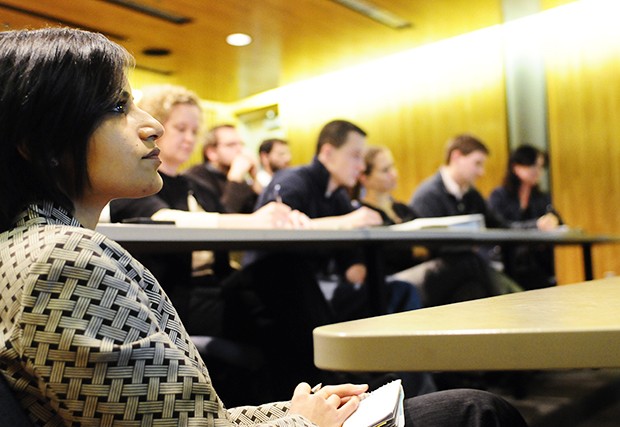Between writing papers, preparing presentations and cramming for tests, most college students have gotten to know and dread the all-nighter. But when it comes to one of his classes, civil engineering graduate student Pete Daniels said he and some of his classmates have actually started looking forward to trading in sleep for homework. Daniels is one of 12 University of Minnesota students taking a pilot course developed by the nonprofit Acara Institute that aims to get multidisciplinary, cross-cultural teams of students working to solve global problems. This semester, six teams from three colleges and one team of high school students took on the broad challenge of improving water access in the slums of Mumbai , India. Each team is working with industry mentors and student counterparts in Mumbai to understand slum residentsâÄô water-access issues, narrow their focus to a particular aspect of the problem and develop a sustainable business model for a product or service that remedies it. Friday, the three University teams presented their solutions for the first time. Connie Rutledge , associate director of Carlson Ventures Enterprise , and several business students in the program offered critiques for the teams to consider as they refine their solutions and business plans. At the semesterâÄôs end, their efforts will be rewarded with more than a letter grade âÄî the team with the best of the seven proposals wins a trip to Mumbai, where theyâÄôll explore implementing their solution. Tuesday night, Daniels and his three teammates were discussing which statistics, photos and calculations they needed to back up their proposed solution, a rainwater harvesting system. According to the âÄúWaterlinkâÄù teamâÄôs presentation, water from MumbaiâÄôs municipal taps is only available for several hours in the morning to Mumbai slum residents, and they have to walk and wait in line for it. The team proposed installing gutters to direct monsoon-season rain water off slum dwelling roofs into existing backyard pits and lining those pits with concrete. This would give residents another water source for things like bathing and cooking, which may decrease the time they spend collecting municipal tap water, the team said. Other University teams proposed a water-pasteurization indicator and a community-managed water sanitization and storage source. When 3M business development manager Erin Binder (whoâÄôs since been rehired) got laid off last fall, she and Fred Rose, Honeywell technology and strategy director and founder of High Tech Kids , another local nonprofit, started talking about what theyâÄôd do if they could do anything they wanted. BinderâÄôs dream job, she said, would be to work on start-ups that address difficult social issues that matter to her. ThatâÄôs what the class is meant to help students do. Though the class is unusual, itâÄôs the kind of thing Rose thinks schools and students are hungry for. After he and Binder came up with the idea in the fall, they were able to get classes set up quickly at the University and institutes of technology in Chicago and Mumbai. ItâÄôs set up in the UniversityâÄôs civil engineering department as a three-credit special topics class and taught by professor John Gulliver . Instead of lecturing, he organizes guest speakers to talk about things like product design and business planning. It will count as a technical elective for undergraduates, Gulliver said, but may or may not count toward graduate studentsâÄô degree programs. The credits donâÄôt matter so much to public health graduate student Katarina Grande . âÄúI was just so excited about the concept of the competition,âÄù she said, âÄúthat I didnâÄôt really care if it didnâÄôt apply to my degree.âÄù Still, Rose said over time, theyâÄôll work on getting the class integrated into different programsâÄô curricula. âÄúThatâÄôs definitely a challenge,âÄù he said. Another is funding. They have some from Cargill , Binder said, which will likely sponsor the winning teamâÄôs trip, but the programâÄôs mostly running on time donations from her, Rose and other volunteers. But theyâÄôll need to hire some staff if theyâÄôre to expand the class, Binder said. They plan to add one more partner school in India for the fall semester course, and in the spring, Binder would like to see it opened up to as many as 10 universities âÄî but that will require more funding.

Image by Ashley Goetz
Students compete for India
U class looks to improve water access in India
One team will travel to Mumbai to implement their idea.
Published April 5, 2009
0
More to Discover







